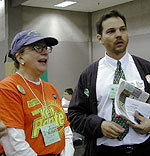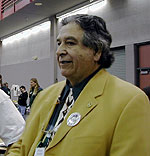By Jeff Horwich
Minnesota Public Radio
May 20, 2002
Minnesota's newest major political party has chosen its slate of candidates for this year's election. The Green Party says it's ready to take on the established parties in races for governor, U.S. Senate, Secretary of State, and State Auditor.
| |
|
|
|
||
Green Party organizer Ken Pentel began his first run for governor in 1998 under humble circumstances.
"Four years ago we had an endorsing convention with about 20 people. We walked outside under a tree, by and about 15 or 20 of us did our endorsement right then and there," he recalls.
This time, Pentel's send-off came from nearly 400 delegates in the St. Cloud Civic Center Saturday. Pentel took almost 85 percent on the first ballot. He beat a 25-year-old challenger, Nick Raleigh, who seemed to have won the admiration but not the confidence of most delegates.
Pentel says the party's undergone an "amazing transformation." Ralph Nader's presidential run two years ago coincided with growing grassroots organizing efforts by people like Pentel. When Nader took more than five percent of the Minnesota vote, the Green Party won major-party status.
Now the party of grassroots democracy finds itself with automatic ballot access, and a chance at $250,000 of state money for the fall campaign. They've got city council members in Minneapolis and Duluth and 16 local chapters around the state.
The Green Party platform stands on four principles: environmentalism, social and economic justice, nonviolence, and grassroots democracy. Pentel rallied delegates with calls for universal health care, free higher education, and electoral reform. But in caucuses this spring, Green Party members named energy policy their top concern.
"In my campaign, state energy policy will change," Pentel told delegates. "As most of the people in this room know, 97 percent of our fuel is imported. We spend $7 to $10 billion a year on dependencies on coal, oil, uranium, gas, and big hydro, when Minnesota and this region knows how to produce our own fuels efficiently and renewably."
| |
|
|
|
||
Pentel called for more solar power and more state programs to reward households and businesses that save energy. Most candidates embraced the Green platform wholeheartedly, though there were some differences on gun control and the rights of hunters and anglers.
The convention had its difficult moments. A 30-minute adoption of the rules turned into three hours. And Greens berated themselves for a lack of blacks or women seeking nominations. Green Minneapolis City Council member Natalie Johnson Lee, who is African-American, told delegates they need to look like the world they're trying to change.
And the convention hit a snag with the endorsement for U.S. Senate. A group calling itself "Greens for Wellstone" showed up bearing a letter of support from Winona LaDuke, Ralph Nader's running mate in 2000. Minneapolis delegate Bob Lamb says Sen. Wellstone is the closest thing to green anywhere in the federal government.
"Would they rather vote for a Green Party Senate candidate who may, under the best circumstances, get 2 or 3 percent of the vote, and then have Coleman win, and the Republicans gain control of the Senate? What Green issues will advance if Republicans have control of the Senate?" Lamb asked.
In the end, this campaign for "none of the above" was eliminated on the first ballot, though Greens for Wellstone say their effort will continue. Late Saturday, after four runoffs, the party chose Ed McGaa for Senate. McGaa is an Oglala Sioux and a decorated veteran. He's a former assistant city attorney for St. Paul and an author of numerous books linking native wisdom to modern ecological problems. He told delegates he looks forward to representing the "Green tribe."
"You're going to change the world, it's part of Black Elk's prophecy. It's part of many prophesies. It's coming. We are in the age of communication, it's here," he said.
| |
|
|
|
||
The Green Party needs at least 5 percent in a statewide race to keep its major party status. It seems most likely to do this in the races that may get the least attention - Secretary of State and State Auditor.
The Green candidates for secretary of state and state auditor said they're confident they'll do even better and could even win in November.
Berger, a sociology professor at Inver Hills Community College who's running for auditor, said that in each of the state's five previous election cycles - going back 20 years - at least one third-party statewide candidate won at least 5 percent of the vote. He that noted in a three-way race, a Green candidate would need just 33 2/3 percent of the vote to win. And he said the endorsed GOP and DFL candidates - Eagan Mayor Pat Awada and state Rep. Greg Gray of Minneapolis - aren't much better known statewide than he is.
Koebrick, who works in Web design for the state agency Minnesota Planning, will be up against better-known candidates in the DFL's Hubert H. "Buck" Humphrey IV - grandson of the late vice president - and Republican incumbent Mary Kiffmeyer. Koebrick said his six years of experience in state government and his work with other agencies makes him more qualified than either of his opponents.
And, in keeping with Green values, Koebrick plans to campaign across the state this summer by bicycle.
More from MPR


